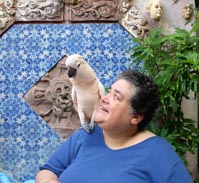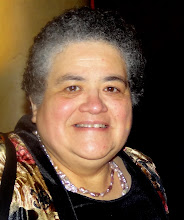| Too Few Latinos in Baseball's Hall of Fame |  |
| Our Voice - Lo Que Es | |
Written by RosaMaria Pegueros | |
|
Of the 289 players that have been named to the Baseball Hall of Fame, only ten are Latinos. Rosie Pegueros wants to know why. Spring is coming, and my thoughts turn to spring training. I forget about my winter preoccupations and start reading the baseball gossip. The one thing I really miss about living in Los Angeles is going to opening day at Dodger Stadium. There’s just something about being outside in the sunshine, the sound of radios all around broadcasting the game simultaneously in English and Spanish, and the roar of the crowd with every small victory. I’ve always loved the game. I grew up in San Francisco where, when I was very young, the Seals played until the Giants moved from New York to the City (as we natives call SF) in 1957. The Giants have the distinction of having won more games than any other team in the history of organized sports and of having the greatest number of Hall of Famers. Raised in a house full of brothers and a father who loved it, baseball was all around me. The famed Russ Hodges was always on the radio calling the games. My dad and the boys collected baseball cards and played on the street, in school, and on the local police leagues. I remember listening to the feats of Orlando Cepeda and Matty, Felipe and Jesus Alou, three brothers from the Dominican Republic, and, of course, the great Roberto Clemente. Even at a young age, I was proud of the Latino players. Later, in the 70s and 80s, part of the delight of going to Dodger games was getting to see Fernando Valenzuela, a young Mexican whose thrilling pitching won him the Cy Young Award and Rookie of the Year Award in his first season with the Dodgers. You can imagine my interest when one of my college seniors asked if he could do his research paper on Latinos in baseball. This young man, who is not himself Latino, was the warm-up pitcher for our local team, the Pawtucket (Rhode Island) Red Sox (locally known as the Pawsox), the Triple-A farm team for the Boston Red Sox. He admired many of the Latino players so, why not? I was shocked when my student told me that of the 289 players that have been named to the Baseball Hall of Fame, only ten are Latinos. Ten?! That’s not even three percent. He was stunned; I was stunned. Are you SURE? He was. I went home and Googled the Baseball Hall of Fame. How could a game that is truly American a game as could be, that is played all over Mexico, Central America and the Caribbean, as well as the United States, and with so many outstanding Latino players on U.S. teams, have only ten Latino players in the Hall of Fame? The best known of the Latino Hall of Famers is the great Roberto Clemente (Puerto Rico) of the Pittsburg Pirates who died tragically in an airplane crash, trying to bring disaster relief to victims of the 1972 Nicaraguan earthquake. Then there is Rod Carew (Panama) who, primarily with the Minnesota Twins, maintained one of the highest hitting averages in history and won ten batting titles. Then, in alphabetical order: shortstop Luis Aparicio (Venezuela); first baseman Orlando Cepeda (Puerto Rico); pitcher Martin Dihigo (Cuba); pitcher Alfonso Ramon “Lefty” Gomez (Mexican American, California); pitcher Juan Marichal (Dominican Republic), and first baseman Tony Perez (Cuba). The latest additions, in 2006, include pitcher Jose Mendez (Cuba) and executive/pioneer Alex Pompez (Cuban American, Florida). There are few things that are as American as baseball, hot dogs, and apple pie, but racism is one of them. African Americans did not break into the majors until 1947. Until that time, Blacks were kept in the Negro Leagues. When Jackie Robinson was selected to break the color barrier, he was counseled to eschew fighting back when confronted by racism. Playing in the Dodgers' farm team, among the challenges he faced were the objections of his teammates to riding the team bus with him. Cepeda’s road into the major leagues was not a direct one. In those bad old days, he came up through the Cuban and the Negro leagues before getting into the majors. Cepeda was not only Puerto Rican; he was black. Who elects the members of the Baseball Hall of Fame? Sports writers! One can disparage these shining practitioners of public literacy, but it is the only game in town. An actor can make fun of the Academy Awards, but the fact is that the Golden Globes and the People’s Choice Awards don’t hold a candle to the Oscars. As a humble academic, I can but rarely afford the cost of a ticket to Fenway to see the Red Sox play. But as a historian, and a believer in keeping an accurate record, the numbers bother me: ten Latinos out of 289 Hall of Famers. Today there are 750 players in Major League Baseball; 314 (42%) are Latinos born in Latin America, and 58 U.S.-Latino players: together, 372 players—almost half of the players in MLB. Barely 3% of the game’s retired Latino (both U.S.-born and Latin American) players, managers, and executives have made it into the Hall of Fame. Maybe the sportswriters shouldn’t be the only ones making the choice. After all, how many years do they stay in the profession and vote for the winners? Thirty years? Forty years? The judges change much more slowly than the athletes they judge, dragging their private biases and prejudices into every vote. Racism and ethnic prejudices have changed dramatically in the last forty years. If only there were some way to democratize the choice! But absent the active participation of aggrieved Latino players, it will never happen; the fact that only a quarter of the Latino players are U.S.-born contributes to their invisibility in the Hall of Fame. What I would love to see is a movement of baseball professionals to take the Hall of Fame selection process away from the sportswriters. Luckily for me, the Pawsox play in a stadium that is near me. Nobody knows them now, but they feed new players to “the show,” the big leagues. Who knows? The next Juan Marichal or Roberto Clemente might come from Pawtucket, and I will get to watch him play before he’s rich and famous. Ah, springtime… posted on MiApogeo.com on Monday, March 30, 2009 http://miapogeo.com/main/content/view/852/1453/ | |

